(55737 products available)
























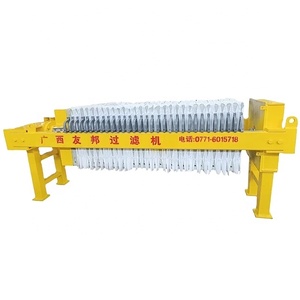























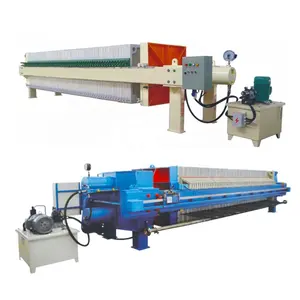












































































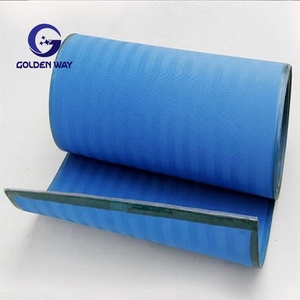



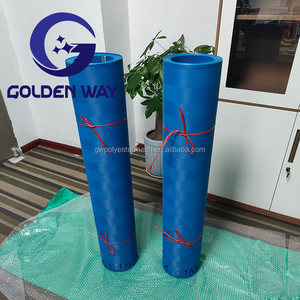




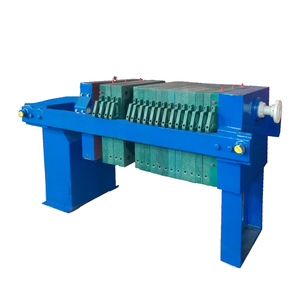



















filter presse are essential components in the realm of industrial cleaning equipment, specifically designed to separate solids from liquids in various processes. These machines employ pressure filtration techniques to achieve efficient separation, making them indispensable in industries such as pharmaceuticals, chemical manufacturing, and wastewater treatment. By utilizing the principles of hydraulic pressure, filter presse effectively compress and filter slurry into dry solid cakes, enabling the recovery of valuable liquids and reducing waste disposal costs. Their robust construction and ability to handle high-pressure applications make them a reliable choice for businesses looking to optimize their production processes and improve environmental sustainability.
There are several types of filter presse available, each tailored to specific industrial needs. The most common types include plate and frame filter presses, recessed plate filter presses, and membrane filter presses. Plate and frame filter presses are known for their simplicity and adaptability, making them suitable for small to medium-sized operations. Recessed plate filter presses offer enhanced filtration capabilities and are ideal for applications requiring higher pressure and larger volumes. Membrane filter presses incorporate flexible membranes that expand during the filtration process, allowing for further dewatering of the filter cake. Each type of filter presse offers unique benefits, ensuring that businesses can find the right solution for their specific filtration requirements.
filter presse perform crucial functions in industrial settings, primarily focused on solid-liquid separation. These machines are equipped with features such as automatic plate shifting, high-pressure hydraulic systems, and advanced control panels. Automatic plate shifting simplifies the operation and reduces manual intervention, enhancing efficiency and safety. High-pressure hydraulic systems allow for effective compression of the filter cake, maximizing liquid recovery. Advanced control panels provide precise monitoring and adjustments, ensuring optimal performance under varying conditions. The versatility of filter presse enables their use in diverse applications, from mining and metallurgy to food processing and pharmaceuticals, highlighting their importance in modern industrial operations.
The construction of filter presse involves the use of durable materials engineered to withstand high pressure and corrosive environments. Typically, the frames are made from stainless steel or cast iron, providing structural integrity and resistance to chemical exposure. Filter plates are crafted from polypropylene or other synthetic materials, offering excellent chemical resistance and longevity. Additionally, the filter media used in filter presse can vary based on application needs, including woven fabrics, synthetic meshes, and paper filters. The choice of materials impacts the machine's performance and durability, ensuring reliable operation even in demanding industrial settings. Manufacturers continually innovate to improve the materials used in filter presse, focusing on enhancing efficiency and sustainability.
Proper maintenance of filter presse is crucial for ensuring their longevity and optimal performance. Routine inspections of hydraulic systems, filter plates, and control panels are essential to identify and rectify issues before they escalate. Regular cleaning of filter plates and media prevents blockages and maintains filtration efficiency. Lubrication of moving parts and timely replacement of worn components are necessary to minimize downtime and extend the lifespan of filter presse. Additionally, operators should be trained in best practices for handling and maintaining these machines to avoid errors that can lead to operational inefficiencies. By adhering to maintenance protocols, businesses can ensure that their filter presse operate at peak performance, contributing to cost savings and improved productivity.
When selecting filter presse for industrial applications, it is vital to consider several factors to ensure optimal performance and efficiency. The first consideration should be the type of slurry being processed, as different slurries require specific filtration methods. The particle size distribution, chemical composition, and temperature of the slurry can influence the choice of filter presse. Additionally, the desired level of dryness for the filter cake and the volume of liquid recovery are key determinants in selecting suitable machinery. Understanding these parameters will guide businesses in choosing filter presse that align with their operational needs.
Another important aspect is the capacity requirements of filter presse. Depending on the scale of production, businesses must assess the throughput capabilities of the equipment to match their processing demands. Larger operations may benefit from high-capacity models that can handle significant volumes, while smaller setups might prefer compact, efficient units. It's also crucial to consider the level of automation required; advanced control systems can streamline operations and reduce manual intervention, thereby enhancing productivity. Evaluating these factors ensures that the chosen filter presse meets the specific needs of the application.
Regular maintenance of filter presse is essential to ensure their longevity and efficiency. It is recommended to conduct routine inspections of hydraulic systems, filter plates, and control panels to identify potential issues early. Cleaning the filter plates and media regularly helps prevent blockages and maintains filtration efficiency. Ensuring proper lubrication of moving parts and timely replacement of worn components can minimize downtime and extend the lifespan of filter presse. Implementing these practices contributes to consistent performance and reduces operational costs.
To optimize the performance of filter presse, businesses can focus on a few critical areas. Ensuring the correct alignment and sealing of filter plates is crucial for preventing leaks and maintaining pressure. Adjusting the cycle times according to the specific characteristics of the slurry can enhance efficiency. Monitoring the pressure levels and making necessary adjustments can improve the quality of the filter cake and liquid recovery. Additionally, investing in training for operators can lead to better handling and operation of filter presse, thereby maximizing productivity.
Common challenges associated with filter presse include dealing with varying slurry compositions that can affect filtration efficiency. Abrasive or corrosive materials in the slurry can lead to wear and tear on filter plates, requiring frequent maintenance. Managing the disposal of filter cake can also pose challenges, particularly in industries with strict environmental regulations. To mitigate these issues, businesses should select filter presse that are specifically designed to handle their unique operational conditions and adhere to environmental standards.
Yes, filter presse can be customized to meet specific industrial requirements. Customization options include selecting suitable materials for filter plates and frames to withstand chemical exposure and high pressures. Advanced control systems can be tailored to provide precise monitoring and adjustments according to the application's needs. Businesses can also opt for specialized designs that cater to unique slurry compositions, enhancing the machine's efficiency and output. Customizing filter presse ensures that they deliver optimal performance in their intended applications.
When upgrading filter presse, businesses should assess the current and future demands of their operations. Evaluating the capacity and throughput requirements is crucial to ensure the upgraded model can accommodate increased production levels. It's also important to consider advancements in technology, such as improved automation features and enhanced filtration capabilities, which can lead to better performance. Compatibility with existing systems and infrastructure should be reviewed to facilitate seamless integration. By considering these factors, businesses can make informed decisions when upgrading filter presse to meet evolving industry needs.